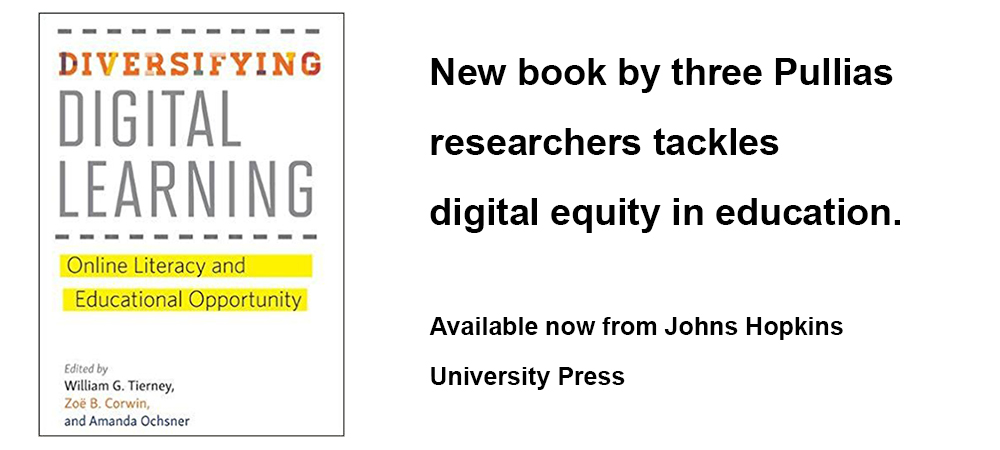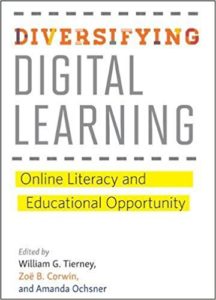
Diversifying Digital Learning: Online Literacy and Educational Opportunity

New book by Pullias researchers tackles digital equity in education.
Technology is often touted as a tool that provides more open access to education, but a persistent digital divide marginalizes youths from underserved communities, according to a new book edited by Pullias Center researchers.
Diversifying Digital Learning: Online Literacy and Educational Opportunity, to be published Feb. 1, 2018, by Johns Hopkins University Press, seeks “to provide a framework for understanding how marginalized youth most effectively engage with technology — and how social organizations help or hinder growth of digital literacies.”
This collection of timely scholarly research reflects the editorial work of three researchers at the Pullias Center: co-director William Tierney, research associate director Zoë Corwin, and Amanda Ochsner, former Pullias Center postdoctoral scholar and now assistant professor at the University of Findlay.
___
Media contact: (for review copies, interview requests, and general inquiries)
Emma All, Publicist, Johns Hopkins University Press | 410-516-6930 | eea@press.jhu.edu
Download the press kit: PDF | Word
Order the book: Amazon | Johns Hopkins UP
—
About Diversifying Digital Learning
Many schools and programs in low-income neighborhoods lack access to the technological resources, including equipment and Internet service, that those in middle- and upper-income neighborhoods have at their fingertips. This inequity creates a persistent digital divide—not a simple divide in access to technology per se, but a divide in both formal and informal digital literacy that further marginalizes youths from low-income, minoritized, and first-generation communities.
Diversifying Digital Learning outlines the pervasive problems that exist with ensuring digital equity and identifies successful strategies to tackle the issue. Bringing together top scholars to discuss how digital equity in education might become a key goal in American education, this book is structured to provide a framework for understanding how historically underrepresented students most effectively engage with technology—and how institutions may help or hinder students’ ability to develop and capitalize on digital literacies.
This book will appeal to readers who are well versed in the diverse uses of social media and technologies, as well as less technologically savvy educators and policy analysts in educational organizations such as schools, afterschool programs, colleges, and universities. Addressing the intersection of digital media, race/ethnicity, and socioeconomic class in a frank manner, the lessons within this compelling work will help educators enable students in grades K–12, as well as in postsecondary institutions, to participate in a rapidly changing world framed by shifting new media technologies.
___
Editors
William G. Tierney, Zoë B. Corwin, and Amanda Ochsner
Contributors
Young Whan Choi, Zoë B. Corwin, Christina Evans, Julie Flapan, Joanna Goode, Erica Hodgin, Joseph Kahne, Suneal Kolluri, Lynette Kvasny, David J. Leonard, Jane Margolis, Crystle Martin, Safiya Umoja Noble, Amanda Ochsner, Fay Cobb Payton, Antar A. Tichavakunda, William G. Tierney, S. Craig Watkins
___
Advance praise for Diversifying Digital Learning
“Important and timely, this book ties together the research happening in digital media and learning with that happening in formal educational institutions to illuminate key issues surrounding technology and schools. A real step forward.”
— Kurt Squire, coeditor of Games, Learning, and Society: Learning and Meaning in the Digital Age
“Useful, informative, and innovative, Diversifying Digital Learning brings together top scholars in the field of education to cover a variety of relevant and timely topics. The collection is interesting not just from an academic standpoint but an ethical one; this book is a worthy addition to our understanding of the issues surrounding equity and education.”
— Karen Schrier, author of Knowledge Games: How Playing Games Can Solve Problems, Create Insight, and Make Change